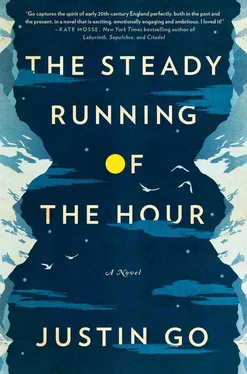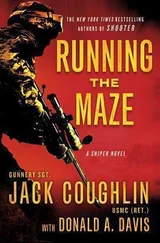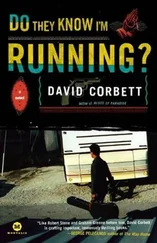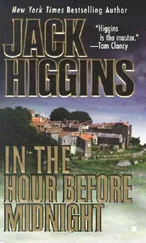Ashley had not set foot in England since 1919. It was only now, encircled by snowy peaks in every direction, that he began to wish for a fantastical version of his homeland, a sleepy kingdom draped in rain and foliage. He longed for the sea, for the wreaths of fog that swathed the coast, for the curtains of water rolling up and down the shoreline. And he knew he did not need to train for Everest. The other climbers had told him the mountain was a question of force rather than finesse, a problem of sheer endurance.
Within a week Ashley was in London. He took a temporary flat near Coram’s Fields and wandered among the places he had once known, feeling himself a ghost returned to dwell with the living. In the evenings he skipped rope in his flat on a Moroccan rug beside the desk, the raindrops pattering the window and soaking the pavement outside. He made tentative steps toward polite society: meetings at the Alpine Club; a show in the West End; drinks at the Café Royal. He prepared for a barrage of questions about the past few years. Where had he gone and what had he been doing? What were his plans for the future? And yet, as it happened, the whole city seemed hardly to have noticed his absence.
— The spymaster himself, they said, clapping him upon the shoulder. Haven’t seen you about lately. Where have you been lurking?
It seemed unfair to Ashley that the city could go on so forgetfully without him, so forgetful of all the people it had lost. He knew this sentiment was absurd, but he could not help it. The lawns of Regent’s Park looked no different than they had in 1916, and yet they could not feel more different. At once Ashley recalled all the bitterness from five years before: that they should go on serving pineapple ices at Gunter’s; that magazines should print reverential pictures of the wedding of Lady Diana Manners; that Chu Chin Chow should attract huge crowds at His Majesty’s Theatre — while Jeffries and Ismay and Bradley and a million others lay in bone-heaps beneath the mud of France, their rotting corpses wrapped in rubberized sheets. In 1919 stonemasons all over Europe were amassing fortunes from the obelisks they erected in every village square, and Ashley supposed that the more obelisks they erected and the more hymns they sang, the faster they transformed the dead into the faceless mass they were fast becoming.
For nothing had obliterated Ismay so much as merging him with the Glorious Dead — a man whose chief quality had been resistance to all such cant, a vulgar and brave creature whom Ashley had never understood. Only later had it come to Ashley, in flashes while riding in a motorcar on the edge of the Nefud Desert, the driver chanting a cyclic tune in Arabic; or in a mountain hut in the Bernese Oberland, tossing the cover of his eiderdown and lying sleepless upon the wooden bunk. Ashley would think he had forgotten Ismay’s face and then it would come to him all at once — the cocked smile, the unfocused gaze with one green eye and the other brown, Ismay swigging rum from a battered pewter mug as they stood in a vestibule watching the snow fall over the army camp.
Spymaster, do you know what makes us different from them?
No.
The difference is we’re going to survive this war. And do you know why?
No.
Because we’re too damned hopeless. It’s a crime to kick a man when he’s down, and even if God is dead he shan’t allow it. We’re not soldiers, you and I. This isn’t how it ends for us.
Ashley had made little of this at the time, but he understood it more with every passing year. How much Ismay had feared death, so much more than the others, perhaps because he had seen enough of life to know what it was worth. And how deeply Ismay had pitied Ashley, and seen him for what he was, even as Ashley had been blind to it himself. And how all of them — Ismay and Jeffries and all the young officers in France — had been mere children, pantomiming roles in a production whose significance they hardly grasped, pushing on through an irreversible game of courage and death, puffing their chests or raving in waking or sleeping nightmares, but never once speaking earnestly to one another.
Only Ismay had been different, and Ashley could not say why, not even today. They had scarcely known each other, and yet lately Ashley found himself thinking of Ismay more and more, posing questions to him and apologizing for the mildest transgression — a military necktie borrowed and never returned. Or the day Ismay had left the camp, the day the pipes had frozen and burst and Ashley had not come to say good-bye. He never saw Ismay again.
It was these sentiments that had soured London in 1919, and the sourness was still there five years later, in spite of everything Ashley had done in between. What friends he had in the city seemed to find Ashley strange and distant. They did not understand his life and he did not understand theirs, and it could not have been the war, for they had all been in the war together.
Ashley left London the next week. He went to Sutton Courtenay and saw his mother, aged dramatically in the past five years, mellowed but also grown very frail. She left the house only on Sundays now, the housekeeper warned Ashley, and only if the weather was mild. That first night at dinner Ashley told his mother what he had done abroad, sometimes the truth and sometimes pure fantasy, saying always what he thought she wished to hear, for he could not have told her the whole truth even if he had been able to articulate it. Ashley spoke of Everest, carefully avoiding any suggestion that the mountain was dangerous. His mother received all this charitably.
— You’ve done wonderful things, she said. It’s being a soldier that made you so strong.
The next day Ashley rowed his single scull on the Thames, starting in the afternoon and rowing on until he was alone in the blackness, not even seeing the oars dipping into the water. Only the swish of his stroke, the starlight above, the lantern of a passing barge swinging on its lonely prow. He stayed a fortnight at Sutton Courtenay, and the more distant he felt from his own country and his own people, the more important his training became. He had become stateless, no longer an Englishman, hardly an expert on Africa or Arabia or any foreign land. The only thing he was good at was climbing, and it also seemed the only thing he could control.
Ashley bought an Austin Seven saloon and drove to Snowdonia, staying in small inns and double-timing the same paths where he had first learned of mountains. He walked all the daylight hours and sometimes longer, finding that he could overcome fatigue simply by going on, that he could recuperate even while moving. He developed special techniques for breathing that he intended to use at altitude, drawing rhythmic and nourishing breaths that kept pace with his steps. He craved any and every advantage. He wished to know the secret strengths of wild creatures, the raw musculature of animals he had seen in his travels through field glasses or silhouetted in the moonlight beside a glassy mere: the Swiss ibex, the fringe-eared oryx, the Arabian gazelle.
At the new year Ashley drove south and took a cottage on the Pembrokeshire coast. He spent dawn and dusk in fevered sprints along the shore, striding on sand and water and glimmering sea foam, racing the seagulls spiraling above him. He would lift his head as he dashed in ever-longer strides, the birds above wheeling and diving, then soaring with one flap of their wings ten yards beyond him, always just beyond, Ashley chasing with deeper gasping breaths until he had to stop, wheezing, a thousand yards down the strand. He sucked in the air. The cold waves broke over his shins, the gulls floating above him.
Ashley would race anything. He raced the sailboats half a league offshore; he raced the breeze and his own shadow. He raced against Price and Somervell and all of the strongest climbers in Europe, chasing them in a dead heat up some imagined alpine ridge, or picturing with fury how Price would overtake him on Everest’s North Col, were he to betray an inch of slackness. Later Ashley decided none of these men was fast enough, so he sprinted against Paavo Nurmi or Eric Liddell, or any runner he heard accounts of on the wireless.
Читать дальше












